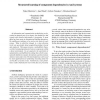Free Online Productivity Tools
i2Speak
i2Symbol
i2OCR
iTex2Img
iWeb2Print
iWeb2Shot
i2Type
iPdf2Split
iPdf2Merge
i2Bopomofo
i2Arabic
i2Style
i2Image
i2PDF
iLatex2Rtf
Sci2ools
116
click to vote
IAT
2008
IEEE
2008
IEEE
Structured Learning of Component Dependencies in AmI Systems
As information and communication technologies are becoming an integral part of our homes, the demand for AmI systems with assistive functionality is increasing. A great effort has been spent on designing and building interoperable middleware solutions to be used as the basis for such system. What is called for, though, is a clear direction in the way uncertainty about acquired knowledge is learnt and employed. This paper presents a probabilistic framework for learning dependencies between components within a home environment. In our approach, the uncertainty is maintained in a probabilistic knowledge base which is automatically built from semantic descriptions and observations of device states and events. The knowledge base can be used by smart applications for performing reasoning about the current flow of system events. Furthermore, some preliminary results obtained from real world data are presented.
IAT 2008 | Intelligent Agents | Interoperable Middleware Solutions | Knowledge Base | Probabilistic Knowledge Base |
Related Content
| Added | 08 Dec 2010 |
| Updated | 08 Dec 2010 |
| Type | Conference |
| Year | 2008 |
| Where | IAT |
| Authors | Todor Dimitrov, Josef Pauli, Edwin Naroska, Christian Ressel |
Comments (0)

